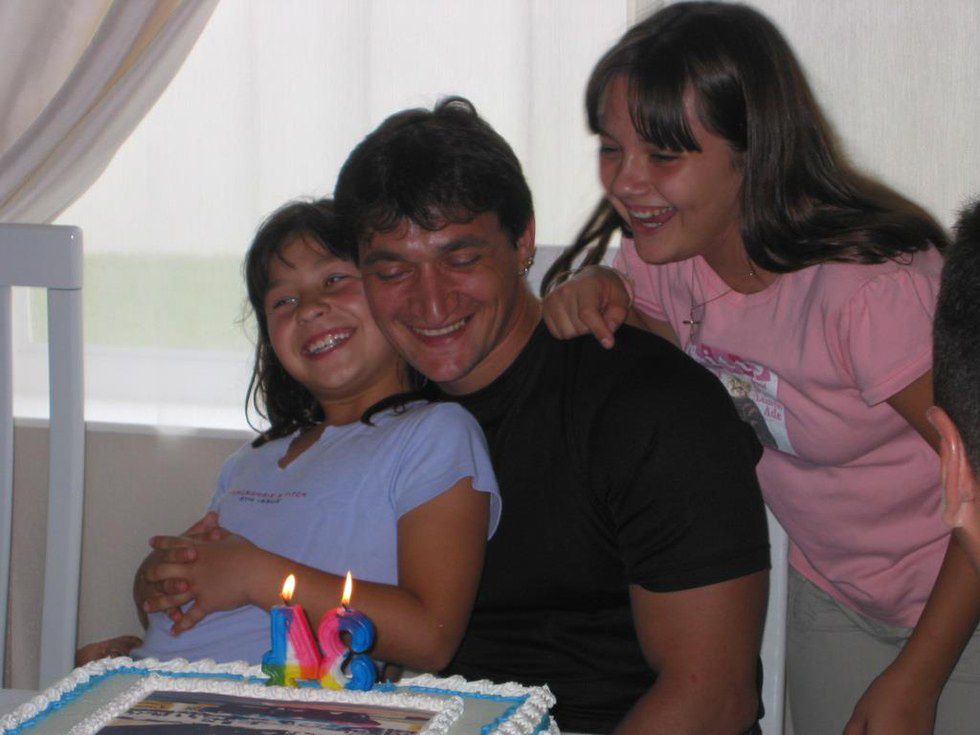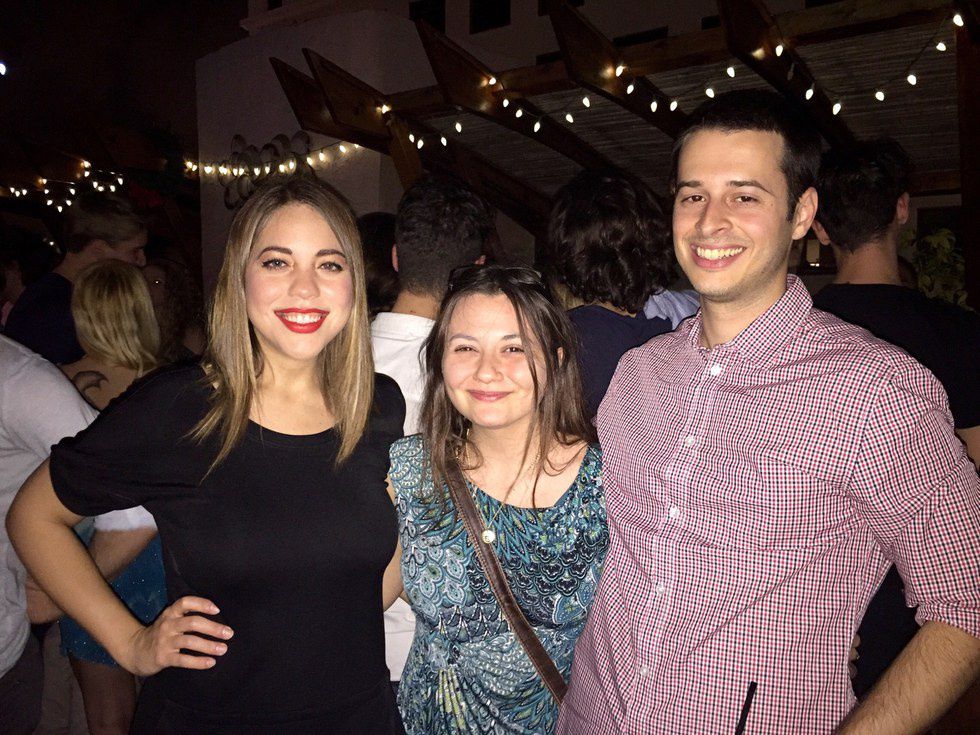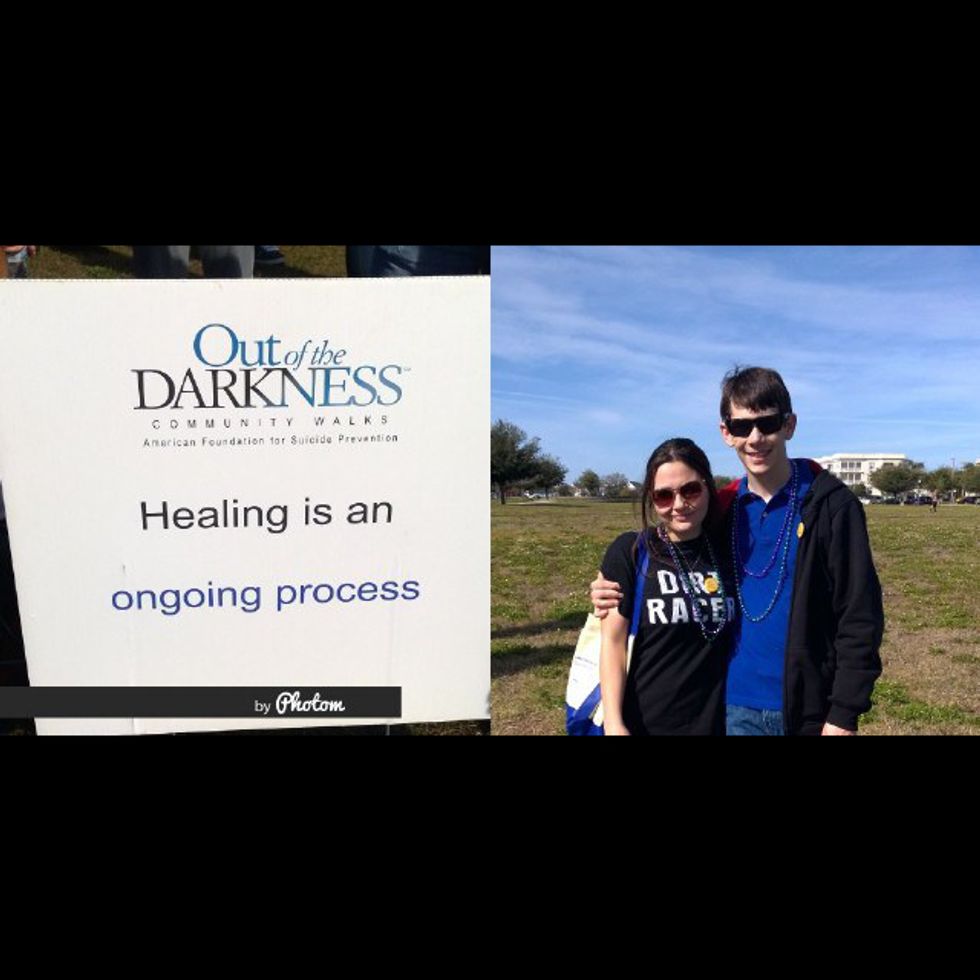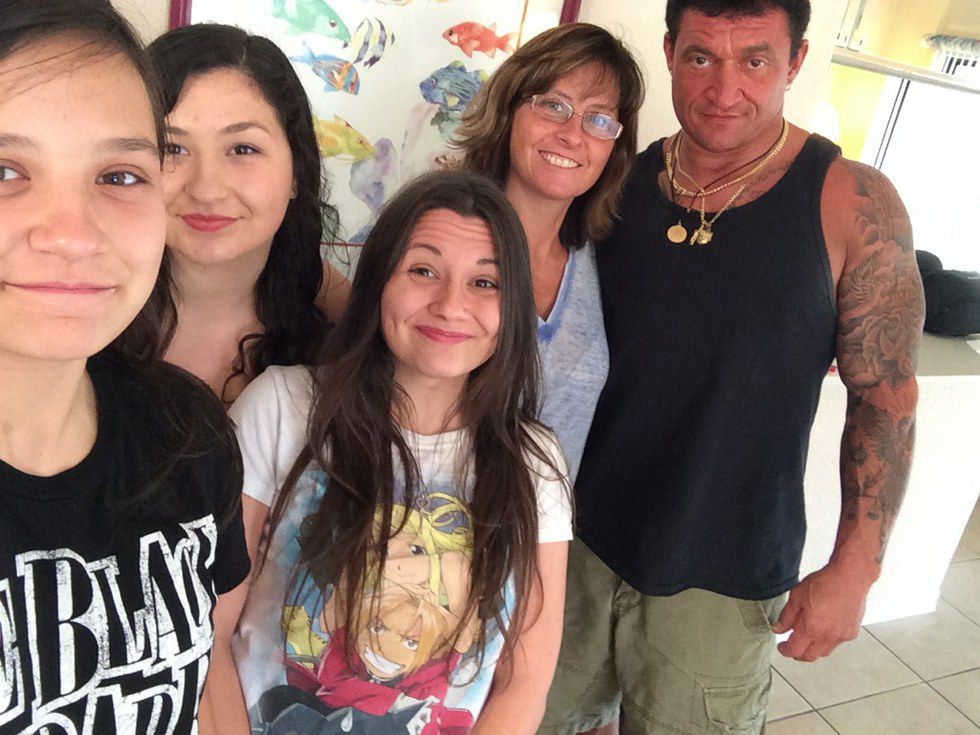I’m about to tell you a story I’ve never told anyone.
When I was in middle school, my parents went through a period where they fought a lot, as most couples do. The disagreements were usually solved within a few days, so my sisters and I tended to camp out in my room until it was over, watching TV or listening to music as loud as we could stand to drown out the sound. We joked and called them dramatic – but I know we were scared.
One day when I was twelve, I heard the garage door open – Dad was home! I geared up to run downstairs to greet him at the door, a tradition we’ve always had – and suddenly, I was terrified. They’re going to fight, I thought desperately. My heart was hammering against my chest; so much adrenaline coursed through my veins I thought I could jump out of my own skin. I didn’t know what to do. In my panic, I turned off the lights, grabbed a rosary, sat behind the door, and started saying the prayers. I started to rock back and forth – a rhythmic movement to focus on while I tried to settle my breathing.
Looking back, I recognize this as my first panic attack.
There were other signs: I’d be so nervous going to my weekly CCD classes I’d make myself sick; sometimes I’d find it hard to breathe. I couldn’t stand to look in the mirror. I thought I was worthless, that everyone would be better off without me in their lives. That was the diagnosis I’d come up with for myself: Chronic Worthlessness, something that could never improve and just needed to learn to manage.
I thought this was normal.
I’d like to think that, for the most part, I hid it well. But I know there were times my parents – even my sister – would give me looks when I said something ‘off’; or when asked to describe me, my friends said I needed to finally realize “just how awesome [I am]’. But those are friends and family, I had reasoned. These were people who, in choosing to stick with me, had to love me – but I didn’t think they’d miss me too much if I were suddenly up and gone.
In my time at University, I studied psychology. I learned the signs and treatment options for anxiety and depression. I knew these things – I got a degree in this study. But you’re warned as a student to be careful in self-diagnosing yourself. And, again, despite all my classes – all the studies – I thought this was just my normal state of being. So I never went to our University counseling center.
I was formally diagnosed with Generalized Anxiety Disorder towards the end of 2013, and Major Depressive Disorder in the summer of 2014. I remember feeling vindicated, relieved even, because that meant there was a state of better I could reach. I could actually get better.
But I was scared, too. Because having diagnosis – a mental illness – going through the steps to receive treatment and help – meant that I was weak. I couldn’t get out of the slump by myself. I’d need to rely on medication and conversations with a stranger to “maintain my sanity.” And of course that was never how I felt about anyone else who relied on medication or therapy; but I held and continue to hold myself to an unattainable standard.
I remember the appointment with the psychologist who diagnosed me with MDD; she asked me, “how long have you had these feelings of worthlessness?”
I told her, after a little thought, “Since I was 11 or 12, I think.”
She was shocked.
The National Alliance on Mental Illness – NAMI – is an American organization that educates, advocates, listens, and leads discussions in mental illness, advocating for helpful public policy, educating communities, and offers help immediately with their NAMI HelpLine. You can learn more about NAMI here. Here are findings for adults pulled from to their studies:
1 in 5 Americans experience mental illness in a given year.
Half of all chronic mental illnesses start by age 14, and three-quarters by age 24.
18.1% of American adults live with anxiety disorders.
Serious mental illness costs Americans $193.2 billion in lost earnings every year.
60% of adults with a mental illness didn’t receive mental health services in the previous year.
And here are findings for children:
1 in 5 children aged 13 – 18 have or will have a serious mental illness.
8% of youth have an anxiety disorder.
The average delay between onset of symptoms and intervention is 8-10 years.
Approximately 50% of students aged 14 and older with mental illness drop out of high school.
Suicide is the second-leading cause of death in youth ages 15 – 24. 90% of those who died by suicide had an underlying mental illness.
I am those statistics. Several of them, in fact. I wasn’t diagnosed with both illnesses until I was 21 years old, nine years after onset; I am a member of the roughly 20% of Americans with an anxiety disorder; my depression and anxiety have cost me lost earnings, because some days it was just too hard – too frightening – to get out of the house.
Mental illness – whether we like it or not – is stigmatized, oftentimes by our own selves. You have to weigh carefully who you tell, and how. I was afraid to tell anyone; I didn’t tell my fiancé (now husband) for a week; when my mom called to ask me about the prescription she had a message about, I told her it was for sleeping medication, because I was having a bout of insomnia. When filling out job applications, you struggle with the question, “should I disclose this to my employer?”
I chose not to; since then though, I’ve mentioned my anxiety and depression in passing to my coworkers, because I don’t want to stigmatize myself anymore. I don’t want to be irritated by the lack of conversation about mental health while never holding a conversation about it myself. I want to educate my loved ones about my illness, why my depression has just as much of an impact on me as a person’s broken arm has on them. The thing is, we tend to have more sympathy for those with physical illnesses and injuries because we can actually see the impact it’s had on them – and yet, both can alter lives irrevocably.
When I finally came out to my parents with my diagnosis, they blamed themselves. They felt like they’d gone wrong somewhere, like they hadn’t told me they loved me enough, that they hadn’t made enough time for me; and no matter how many times I try to explain it, how many analogies I make, or how many reassurances I give – it’s not something they’re able grasp, because depression – but on the whole, mental illness – is incomprehensible.
When I didn’t run downstairs with my sisters to greet my dad at the door, he must have been concerned. Minutes after he walked in, he came upstairs to my room, opened the door; I tried to squish myself into the wall to keep him from seeing me, but twelve-year-olds aren’t exactly invisible. I think I was still rocking back and forth a little. His eyes found mine, looked me over – I flashed a wide smile to try and hide my expression – and he asked, very carefully, “What are you doing?”
“Um.” Think of something. “I just wanted to … sit in the dark.” He gave me a look, helped me up, and had me take a seat on the edge of my bed beside him. He didn’t turn the lights on, which I appreciate looking back on, now.
He asked me again – why I was sitting behind the door, in the dark, rocking back and forth. And I remember telling him, ashamed: “I was afraid you guys were going to fight.”
We talked for a little, and after he gave me a big hug before he went downstairs. I remember my mom asking him what was wrong, why I didn’t come downstairs, but I don’t remember what he told her. I don’t know if he ever told her, and when I brought it up to him before he died, he didn’t remember that night.
Mental health is a part of health – a portion of the whole. Mental health shouldn’t be something you start learning about in your introductory psychology class; it shouldn’t be something you start worrying about or focusing on until young adulthood. When children are sitting in their health class, they should be learning at least about the most common mental illnesses, such as generalized anxiety disorder, depression, obsessive compulsion disorder, attention deficit disorder, etcetera; what signs to look for; who to go to when the signs manifest; how to ask for help, what to read, how to talk to their parents about it; so they aren’t afraid. So they don’t think that something’s wrong with them, or that feeling hatred towards themselves is normal.
When I was twelve years old, sitting in the dark rocking back and forth, I would have loved to have the knowledge that I wasn’t crazy – I just needed a little bit of help.

























